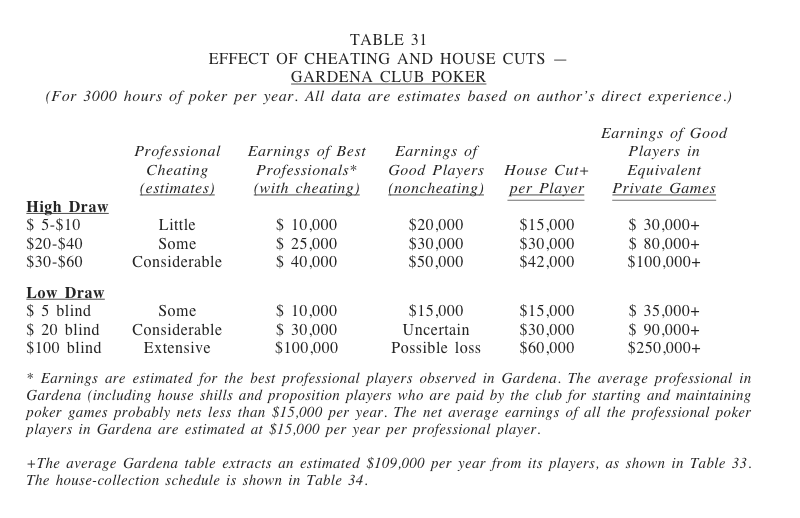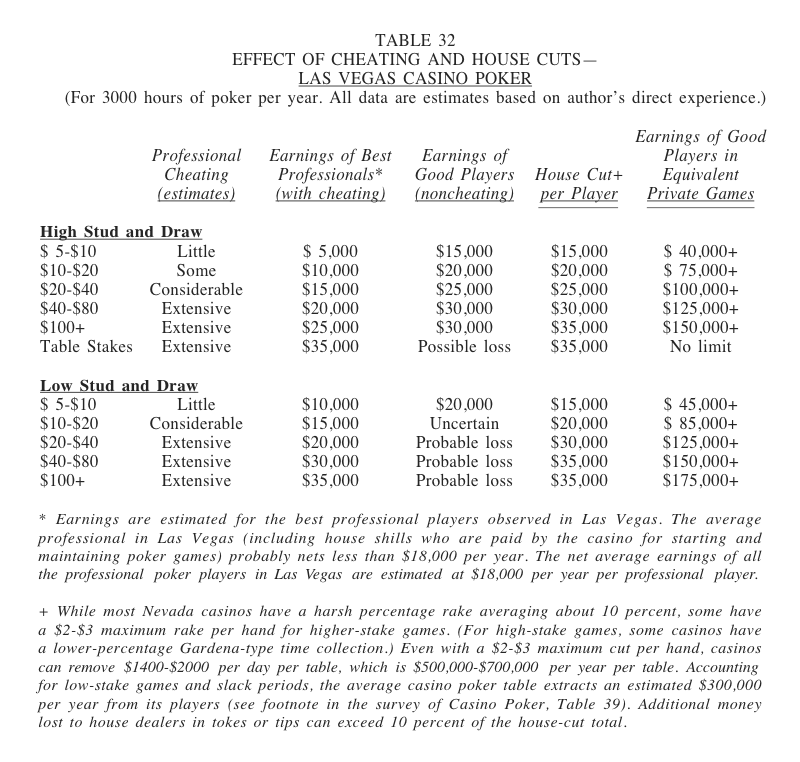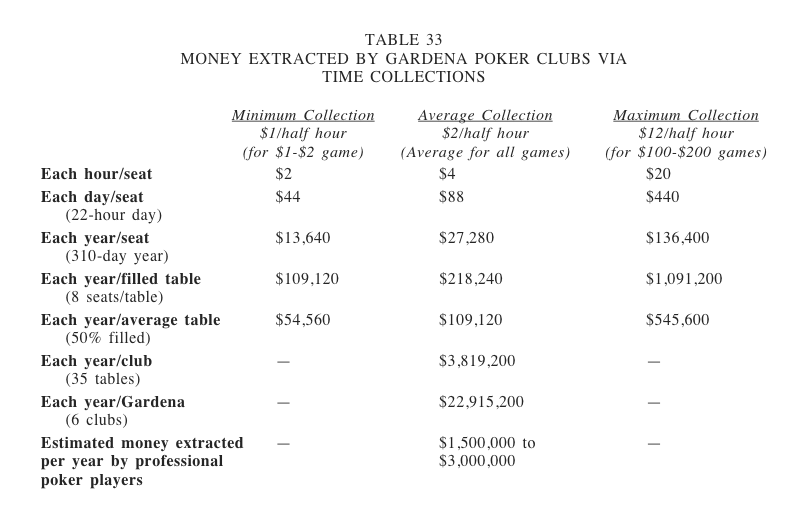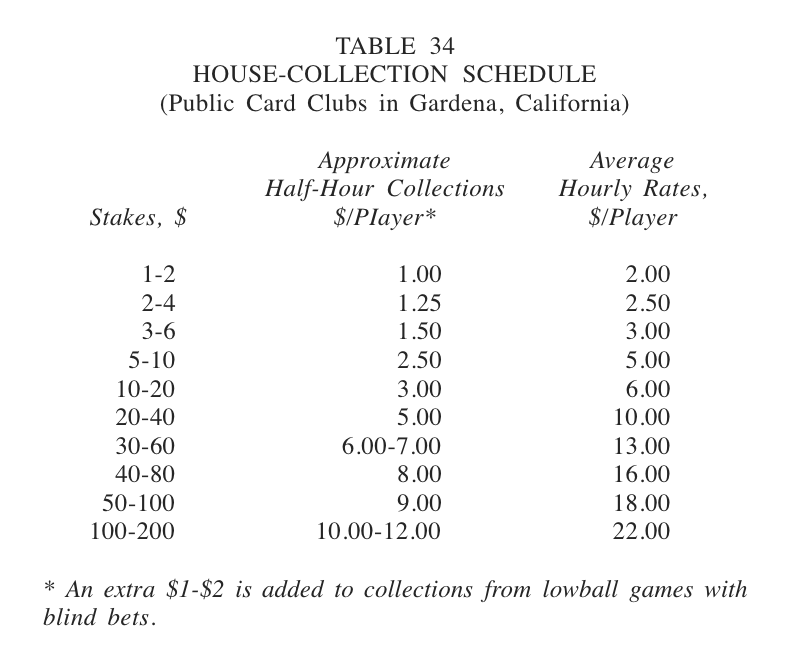The House Cut
For the good player, the most negative feature of public poker is the damage that the house cut (time collection or casino rake) does to his profit potential. Card clubs and casinos, through their continuous collections and raking, gradually but permanently remove most of the available cash from all public games. In private games, the bulk of that house-removed cash would have ended up in the good player’s pocket. Tables 31 and 32 illustrate the draining effect that the house cut has on the earnings of the good player. If the house cut is sufficiently high (e.g., 15 percent or more), the good player may be unable to win over the long term, no matter how great his advantage is over the other players.
The far-right-hand columns of Tables 31 and 32 show that the house cut diminishes the good player’s earnings much more than the amount actually collected from him. That is because the house cut relentlessly drains cash away from every opponent, steadily shrinking the amount of money available for extraction from poor players by the good player. Because of the constantly draining house cut, the poorest players (the good player’s most valuable assets) are driven from the game more quickly than are the tougher players. That phenomenon results in higher concentrations of tough or superior players than would occur in comparable games without a house cut. Also, the house cut produces more losers who, in turn, will play tighter poker, thus further diminishing the good player’s advantage and edge odds.
Adding to the cash drain in casino poker is the toking (tipping) of the house dealer by the winner of each pot. Because of the arbitrary raking power of most casino dealers, toking is necessary to avoid extra-heavy rakes from future pots that the player may win. Toking increases by as much as 20 percent the money removed from the game by casinos. Since public card clubs have no house dealers, their customers are spared that additional drain (although toking of floormen does occur in some high-stake club games).
The house cut (rake) in poker is actually higher than the house cut in most major gambling games such as blackjack, craps, and roulette. The primary difference between gambling and playing public poker is that in gambling, individuals play directly against the house (the casino) and have no way to overcome the house cut or house percentage.28 But in poker, individuals play against one another, not against the house or casino. The good poker player can, therefore, consistently extract money from all inferior players. He will win in casino and club poker if his money extraction from the other players is greater than the amount the house extracts from him. Conversely, the loser or the inferior player takes a double loss in public poker—the loss to the winners and the loss to the house.
_______________________
28 The single exception to the unbeatability of casino games occurs when a Thorpe-type counting system is properly used in blackjack. The validity of blackjack counting systems is limited and provides at best a theoretical advantage of less than 1 percent (or investment odds of less than 1.01). Furthermore, such systems are mainly mechanical and inflexible—they are difficult and boring to apply and basically impractical for accumulating any significant or reliable income. Casinos can eliminate any player advantage in blackjack whenever they want to or need to (which is seldom) simply by increasing the frequency of shuffles until counting becomes impractical or unprofitable. Moreover, by publicizing their feigned dislike and fear of counting systems, casino managements surreptitiously promote and encourage the use of blackjack counting systems. The burgeoning interest in those systems has caused major increases both in blackjack activity and in profits for the casinos. (Technically the game with a house dealer as played in all casinos is “21”; not blackjack in which the deal constantly changes or rotates.)


In calculating his edge odds, the good player must include the house as the biggest winner. As indicated by Tables 31-34, the house will be the biggest winner in almost every game, with the good player averaging a distant second. In private poker, the good player tries to eliminate any competing big winner as quickly as possible (or he quits that game and finds a more profitable game without a competing big winner). But in public poker, the good player can never escape from or eliminate the biggest winner (the club or casino). By playing only in private games and avoiding the house cut, the good player makes himself the biggest winner.29
_______________________
29 In private poker, the good player can sponsor a game with pleasant distractions and discipline-breaking amenities (e.g., “free” gourmet buffets, rich desserts, expensive liquors). But if the good player acts as the house (with profitable collections or rakes), he could cause his opponents to believe that he is sponsoring the games solely for profit (which, of course, would and should be true). Such a belief would make his opponents more defensive and harder to manipulate, and thus harder to control and extract money from. Besides, the good player can win by finesse all available money without having to compete against himself by mechanically collecting money through a house cut. Also, most states consider running a profitable game with regular house cuts an illegal gambling operation. Such activity could leave the sponsoring player vulnerable to a criminal complaint filed, for example, by an unhappy loser … or by the loser’s wife.
The time collections of public poker clubs (e.g., Gardena, California poker club30) are generally less expensive and less harmful to the good player’s earnings than are the percentage rakes of Nevada casinos.31 Still, the Gardena-type time collections relentlessly and permanently remove the major portion of available cash from every game. Table 33 shows that each year, the six Gardena clubs end up with more than ten times the cash that is won by all the professional poker players in Gardena combined. The table shows that the six Gardena poker clubs extract over $22,000,000 per year from their customers.
_______________________
30 California has 400 legal poker clubs. A few other states such as Montana, Washington and Oregon also have legal poker clubs. But by far the most important area for public club poker is Gardena, California, where legalized poker began in 1936. Today, Gardena has six of the most prosperous poker clubs in the country and is the mecca for both amateur and professional public-club poker players.
31Some Nevada casinos are switching from harsh percentage rakes to milder, Gardena-type time collections, especially for their higher stake games. Increasing competition for poker players is causing this trend toward milder house cuts as more and more Nevada casinos, attracted by the profitability of public poker, are adding poker to their operations or are expanding their existing poker facilities. In fact, the maximum rake for some high-stake casino games has fallen below $2.00 per hand, reducing the house cut to well below 5%. But the competition in those games is much stiffer since the best players and professionals gravitate to the low-cut games. But countering the trend toward lower rakes in Nevada casinos, the California card clubs are raising their collection fees as shown in Table 34.
_______________________


Poker generates substantial profits for the club owners—even after subtracting business expenses, high taxes, and an annual payroll of over $8,000,000 (according to the Gardena Chamber of Commerce). Who, then, are the smartest and most prosperous poker players in Gardena? The answer is the quiet, invisible club owners. Indeed, those club owners deserve admiration. What player could ever match their edge odds and consistent winnings from poker?
Still, how do the other poker players fare? If the average professional poker player in Gardena nets about $15,000 per year (estimated in footnote to Table 31), then the estimated 100 to 200 professionals in Gardena would extract $1,500,000 to $3,000,000 per year from all the other poker players. After allowing for those seats occupied by the professionals plus the empty seats and vacant tables during slack periods, the nonprofessional players occupy an estimated average of 800 seats in the six Gardena poker clubs. Those clubs, therefore, must extract $28,500 per year from each of these 800 seats to account for the $22,000,000 permanently removed each year. That means that the nonprofessional regular customer who plays forty hours per week must lose an average of $7000 per year if he plays better than half the other players in Gardena. (And, as a group, the Gardena players are the best and the toughest poker players in the world.) If he does not play better than half the players, he will lose more than $7000 per year by playing forty hours per week. If he is a much better player than the average Gardena player and can extract a net gain of $7000 per year from the other players, he will break even. And if he is good enough to extract a net gain of $22,000 per year from the other players by playing sixty hours every week, he will be in the same class with the average professional poker player by earning $15,000 per year. In other words, except for the few very best and toughest players, people pay dearly in both time and money for the privilege of playing poker regularly in Gardena. And as indicated in Table 32, players in the lower-stake games pay even more dearly for the privilege of playing poker regularly in Nevada casinos because of the higher percentage casino rake, but less dearly in most higher-stake games because of the lower percentage rake.
To earn a steady income from public poker requires an exceptionally tough player with poker abilities far superior to those of the average player. To be a professional poker player in the Gardena clubs or the Nevada casinos requires long, hard hours that yield relatively poor yearly incomes. So most professional casino or club players seem to be wasting their abilities in unrewarding careers. And most other public poker players (the losers) are throwing away their time and money with methodical certainty.